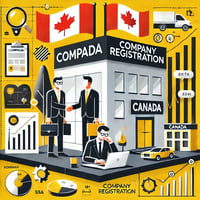
Steps to Set Up a Company:
Canada
Choose a Business Structure
- Sole Proprietorship: Single owner, full liability.
- Partnership: Two or more partners, shared liability.
- General Partnership: Equal responsibility and liability among partners.
- Limited Partnership: General partner with unlimited liability and other limited partners with liability up to their investment.
- Corporation (Incorporation): Separate legal entity, limited liability.
- Federal Corporation: Incorporated under federal law, allowing business across Canada.
- Provincial Corporation: Incorporated under provincial law, allowing business within a specific province.
- Cooperative (Co-op): Owned and operated by its members, with shared decision-making.
Register Your Company
- Choose a Company Name: Ensure it is unique and follows naming regulations.
- Prepare the Articles of Incorporation: Outlining the company’s structure and rules.
- Register with the Federal or Provincial Government: Submit the incorporation documents and pay the registration fee.
- Corporations Canada (for federal incorporation)
- Provincial websites (e.g., ServiceOntario)
- Obtain a Business Number (BN) from the Canada Revenue Agency (CRA): For tax and business identification purposes.
- Register for Goods and Services Tax (GST)/Harmonized Sales Tax (HST) with CRA: If applicable.
Open a Canadian Bank Account
- Set Up a Business Bank Account: Necessary for managing business finances.
Obtain Necessary Licenses and Permits
- Check Industry-Specific Requirements: Depending on the nature of your business, you may need specific licenses or permits.
Comply with Canadian Employment Laws
- Employment Contracts: Draft contracts that comply with federal and provincial labor laws.
- Register for Payroll Deductions with CRA: For tax withholding and social security purposes.
- Register with Workers' Compensation Board: For worker’s compensation insurance.
- Provincial websites (e.g., WSIB Ontario)
- Health and Safety Regulations: Follow guidelines from the Canadian Centre for Occupational Health and Safety (CCOHS).
Accounting and Reporting
- Set Up an Accounting System: Maintain accurate financial records.
- Annual Financial Statements: Prepare and file annual financial statements.
- File Annual Tax Returns: Submit annual tax returns to CRA.
Laws and Regulations to Consider
Corporate Law
- Canada Business Corporations Act (CBCA): Governs the formation and operation of federal corporations.
- Provincial Corporate Laws: Govern the formation and operation of provincial corporations.
Tax Law
- Income Tax Act: Governs income tax for individuals and companies.
- Excise Tax Act: Governs GST/HST regulations.
Employment Law
- Canada Labour Code: Governs employment standards for federally regulated businesses.
- Provincial Employment Standards Acts: Govern employment standards for provincially regulated businesses.
- Occupational Health and Safety Act: Sets health and safety standards for workplaces.
Data Protection Law
- Personal Information Protection and Electronic Documents Act (PIPEDA): Governs data protection and privacy.
Environmental Law
- Canadian Environmental Protection Act: Governs environmental protection and sustainability practices.
Intellectual Property Law
- Trade-marks Act: Governs the protection of trademarks.
- Patent Act: Governs the protection of patents.
By following these steps and adhering to the relevant laws and regulations, you can successfully establish and operate a company in Canada. It’s advisable to consult with legal and financial experts to ensure full compliance and smooth setup.
When to Consider Setting Up a Company in Canada:
- Strategic Geographic Location: Canada’s location provides access to markets in North America and beyond.
- Stable Economic Environment: Canada offers a stable macroeconomic environment with opportunities for growth.
- Highly Skilled Workforce: Access to a highly educated and skilled labour pool, particularly in technology, finance, and healthcare.
- Favorable Business Environment: Canada offers a transparent regulatory system and various incentives for businesses.
- Innovation and Technology: Canada has a strong focus on innovation and technology, with numerous research institutions and tech hubs.
- Quality of Life: Canada offers a high standard of living, excellent healthcare, and a favourable work-life balance, making it attractive for expatriates and international employees.
- Access to Natural Resources: Rich in natural resources, providing opportunities for businesses in mining, agriculture, and energy sectors.
By considering these factors and aligning them with your business goals, you can determine if setting up a company in Canada is the right move for your organization. Consulting with local experts and advisors can further help in making an informed decision.

Step-by-Step Guide: How to set up a Company
Setting up a company involves a series of crucial steps that require careful planning and execution. From choosing the right business structure to understanding legal and tax obligations, each stage is vital to the successful launch and operation of your business. This step-by-step guide provides a comprehensive overview of the key processes involved in establishing a company, ensuring you have the knowledge and tools needed to navigate the complexities of business formation.
